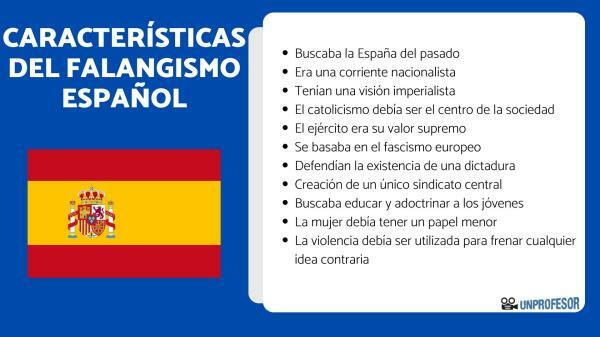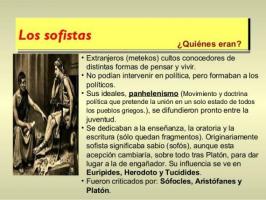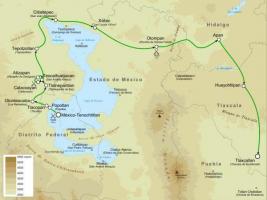11 characteristics of Spanish FALANGISM

During the first half of the 20th century, a series of nationalist and extremist movements known as fascism, having different names depending on the nation, such as Nazism in Germany or Falangism in Spain. To learn in depth the political movement that held power for much of the 20th century in Spain, in this lesson of a Teacher we are going to know the Main characteristics of Spanish Falangism.
The Falangism is a political and economic current born in Spain in 1931, following the example of the fascist movements that were beginning to have power in nations like Italy or Germany. The basis of Falangism is these fascist ideas, but Falangism modifies them to adapt them to the Spanish system, as for example with the inclusion of Catholicism.
The creator and main representative of the party was Jose Antonio Primo de Riverason of the dictator Miguel Primo de Rivera and that he shared with him his dictatorial model. The basic idea of Falangism was to put an end to political parties and form a totalitarian state.
In 1933 the creation of the political party took place Spanish Phalanx, being a party confronting both communist and capitalist ideas, based on the nationalism, Catholicism and violence.
To understand the relevance of Spanish Falangism we must briefly talk about its history and understand the importance it came to have for Spain and the development it had since its origin.
Falangism had its origin in 1931 as a way of adapting European fascist elements to the Spanish context. Shortly after, in 1933, the party was founded Spanish Phalanx, which, led by Primo de Rivera, sought a Catholic and ultra-right dictatorship.
During its first months, Spanish Falangism was characterized by its violence, committing aggressive acts against other political groups and especially the Republicans. The Falangists consider the republicans the great evil of the world and, therefore, it was necessary to attack them violently.
In 1934 the Spanish Falange merged with the far-right JONS group, forming the Spanish Falange de la JONS. The union was a failure, since in the elections of 1936 they did not obtain any deputy.
At the start of the Civil War, the Falange was placed on the side of the nationalists, supporting the coup, and defending a military dictatorship. had a role similar to that of the SS or Gestapo in Germany, because they carried out acts of repression and executions against people who did not think like them.
When Franco came to power, the Spanish Falange merged with the Carlist party, forming the Spanish Traditionalist Falange and the JONS. At that moment the phalanx turned Franco's party, being the only political party until the arrival of democracy.
To end this lesson from a Teacher we must talk about the features of thespanish falangism. Thus, we will be able to understand the importance of this political current, understanding everything that changed in Spain with its coming to power.
The features of Spanish Falangism are the following:
- I was looking for the Spain of the past, that of the Golden Age, making the Spanish think that it can be recovered.
- It was one nationalist current, seeking Spanish unity above all, fighting against the Basques and Catalans, and seeking their repression. He also denied English power in Gibraltar, wanting to recover that territory.
- They had a imperialist vision of the country, considering that Spain should return to being a great empire, although they did not seem to talk about conquering territories.
- Catholicism should be the center of society and enjoying great power, the Phalangists were considered to be half monks and half soldiers.
- The army was his supreme value, the military had to occupy positions of power and be the one that controlled all of society.
- It was based on European fascism, fighting liberals and communists alike, and seeking a dictatorial and nationalist third way.
- They defended the existence of a dictatorship, since they considered that it was the only valid way for Spain to function, being something similar to the European fascist dictatorships of the time.
- Creation of a single union in which the whole world will participate, being the only political institution that could exist.
- He sought to educate and indoctrinate the young, to change their heads and think the same as the phalanx. For this reason, they considered that the Church and the government should control the entire educational system.
- The woman must have a minor role, dedicating herself to the care of the house and the children. Nor did they consider that women should occupy a position of power, not being something natural for the Falangists.
- Violence must be used to curb any idea contrary to Falangism, which is the reason why so many armed youth groups emerged.




